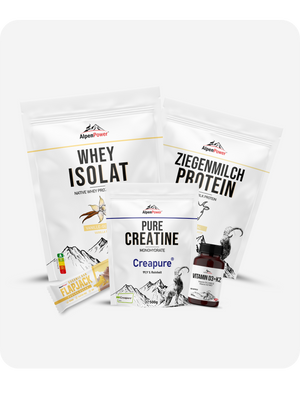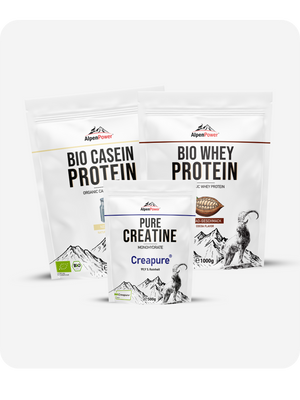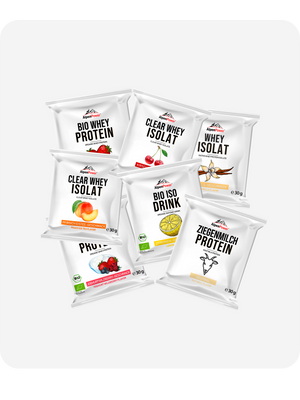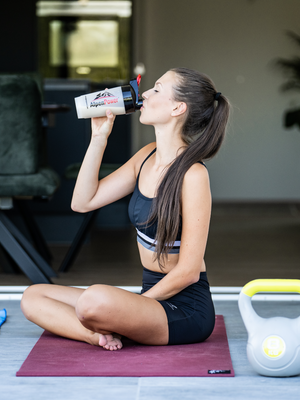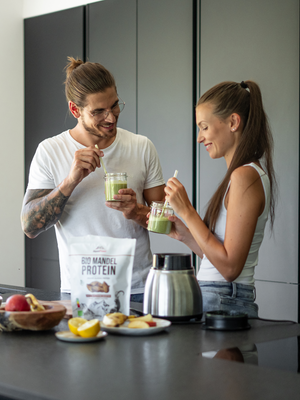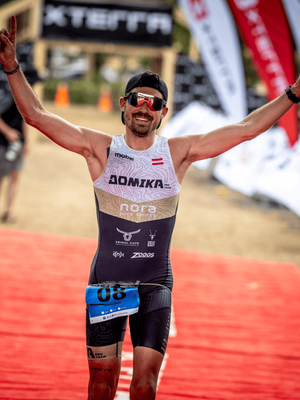How nitrates, carbohydrates and proteins can specifically support maximum oxygen uptake
VO₂max, or maximum oxygen uptake, is one of the key performance indicators in endurance sports. It describes the maximum amount of oxygen that the body can absorb and transport under stress and use in the muscle cells to generate energy. A high VO₂max value is closely linked to increased aerobic performance, better metabolic efficiency and greater resistance to fatigue.
In addition to targeted interval and threshold training, nutrition is increasingly becoming the focus of training science as a performance-modulating factor. According to current studies, foods containing nitrates, a needs-based carbohydrate intake and an adapted protein intake are considered to be decisive factors in supporting and optimizing VO₂max development and adaptation during the training process.
Nutrition and VO₂max - the physiological basis
The increase in VO₂max is primarily achieved through cardiorespiratory and mitochondrial adaptations: increased cardiac output, improved capillarization, increased mitochondrial density and optimized oxygen utilization in the muscle. These processes are dependent on sufficient availability of energetic substrates (especially glycogen), structural building blocks for repair and adaptation processes (amino acids), as well as micronutrients and bioactive molecules such as nitrate and nitrite.
An energy-depleted or catabolic metabolic state inhibits this adaptation - which underlines the crucial role of nutrition in everyday training.
Nitrates - the underestimated booster for oxygen efficiency
Nitrates from natural sources such as beet, spinach, rocket or celery promote vasodilation via the nitrate-nitrite-nitrogen monoxide (NO) pathway and improve capillary blood flow and muscle cellular oxygen transport. In addition, studies show increased mitochondrial efficiency with a simultaneous reduction in oxygen consumption under submaximal stress (Larsen et al., 2007; Bailey et al., 2009).
The recommended dosage is 6-8 mmol nitrate, ideally approx. 2-3 hours before the start of exercise. It is particularly practical to take it in the form of beet juice smoothies, supplemented with AlpenPower organic oat powder, to ensure a supply of complex carbohydrates at the same time.
Exemplary application:
200 ml beet juice + 30 g AlpenPower organic oat powder - around 2.5 hours before an intensive VO₂max session.

Carbohydrates - essential for intensive VO₂max stimuli
High-intensity forms of training in the VO₂max range lead to a rapid depletion of muscle glycogen stores, which limits performance and can reduce the quality of training. Adequate carbohydrate intake before and during exercise ensures a stable supply of energy and, according to studies, improves stimulus processing and long-term endurance adaptation (Burke et al., 2011; Thomas et al., 2016).
AlpenPower Energy Gels provide a combination of readily available sugars (e.g. glucose, fructose) from natural sources, ideal for acute performance stabilization. For longer sessions, we recommend the Bio Iso Drink, which also contains electrolytes to maintain plasma volumes - an important factor for oxygen transport capacity. Recommendation: 30-60 g carbohydrates per hour for sessions >60 min, up to 90 g/h when using polysaccharides.
Proteins - the basis of adaptation
During exercise, carbohydrates dominate as an energy substrate, but after the session, the protein supply determines regeneration and supercompensation. A sufficient supply of amino acids is necessary for muscle repair, enzyme synthesis and the maintenance of mitochondrial structure and function - key aspects in VO₂max adaptation. It is recommended to consume 0.2-0.4 g protein/kg body weight directly after training, preferably in combination with carbohydrates in a ratio of 3:1 to 4:1 (Moore et al., 2009). AlpenPower Organic Whey Protein provides a complete amino acid profile, is rich in leucine (trigger of muscle protein synthesis via the mTOR signaling pathway) and comes from certified organic pasture milk. In combination with the organic oat powder, a high-quality recovery shake is created for optimum regeneration.
Recovery shake recipe:
- 100 g skyr
- 150 g berries
- Easily digestible
- 30 g AlpenPower organic oat powder
- 30 g AlpenPower Organic Whey Protein
- 100-150 ml water

Practical integration in everyday training
Before intensive sessions:
- Beet juice + AlpenPower organic oat powder (nitrate + complex KH)
- AlpenPower Bio Energy Gel (quick KH 15-30 min before the start)
During training:
- AlpenPower Organic Iso Drink (fast energy + electrolytes)
After training:
- Recovery shake with organic whey & organic oat powder (protein + KH for muscle building & glycogen resynthesis)

Conclusion: Nutrition as the physiological key to VO₂max optimization
Targeted nutrition around VO₂max-oriented training works synergistically with the training stimulus:
- Nitrates improve oxygen utilization and blood circulation
- Carbohydrates ensure training quality and energy availability
- Proteins promote structural adaptation and recovery
AlpenPower 's natural, functional products provide high-quality ingredients and enable scientifically based, performance-supporting nutrition - without any artificial additives. Those who strategically combine nutrition and training activate their full endurance potential - and lay the foundation for a real increase in performance.
Author: Laura Bahmann
Sources:
- Thomas et al. (2016) "Nutrition and Athletic Performance" (Academy of Nutrition and Dietetics) → Fundamentals of sports nutrition (KH, protein, micronutrients) → PubMed: 26920240
- Larsen et al (2007) Nitrate lowers oxygen consumption during submaximal exercise → PubMed: 17872489
- Bailey et al. (2009) Nitrate increases endurance and O₂ utilization, especially during intensive units → PubMed: 19661447
- McMahon et al. (2017) Meta-analysis: Nitrate significantly improves endurance performance → PubMed: 27600147
- Burke et al. (2011) KH strategies before/during/after exercise; 30-90 g/h recommended → PubMed: 21735386
- Jeukendrup (2014) Mixed sugar sources (glucose+fructose) increase KH intake & performance → PubMed: 25355191
- Kerksick et al. (2017) Position of the ISSN: Nutrient timing including the use of KH in endurance training → PubMed: 29166775
- Moore et al. (2009) 0.2-0.4 g protein/kg immediately after exercise promotes muscle repair → PubMed: 19892983
- Pasiakos et al. (2014) Meta-analysis: Protein supplements promote strength and regeneration → PubMed: 24740206
- Cermak et al (2012) Protein supports adaptations in the muscle even during endurance training → PubMed: 22237092
